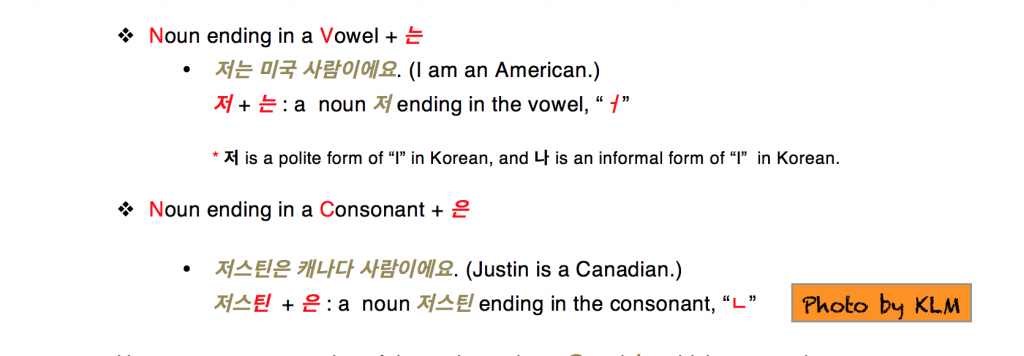What Is a Topic Marking Particle? Posted by Kyung-Hwa on May 31, 2017 in Grammar, Korean Language, Vocabulary
Have you ever wondered what the small words, 이/가, 은/는, or 을/를 in the Korean language mean? It is important to understand the concept of these Korean particles, although they have little or no meaning by themselves. In Korean sentences, subjects, objects, and topics are determined by these particles. In this post, we will explore the topic markers, 은 and는 in the Korean language.
Do you remember when we explored subject marking particles, 이 and 가 in the post “What Is a Subject Marking Particle?” Today, we will explore the Korean topic markers, 은 and 는. These are used to introduce a topic or contrast/compare with someone or something in a sentences. 은 and 는 are attached to nouns: you add는 to a noun when the noun ends in a vowel, and은 to a noun when the noun ends in a consonant.

Here are some examples of the topic markers 은 and 는, which are used to contrast or compare with someone or something in the following sentences.
• 태연은 한국 가수예요. (Taeyeon is a Korean singer.)
부르노는 미국 가수예요. (Bruno is an American singer.)
• 저는 떡볶이를 좋아해요. (I like spicy rice cakes.)
알렉스는 김밥을 좋아해요. (Alex likes Kimbap.)
• 고기는 좋아해요. (I like meat.)
생선은 안 좋아해요. (I don’t like fish.)
• 영어는 어려워요. (English is difficult.)
한국어는 쉬워요. (Korean is easy.)
As I mentioned in my last post, Korean people will still understand your comment without these markers. However, using these markers will help you to deliver your message in a clearer way.
If you need an extra practice, please try to fill in the following blanks. Just remember the following rules when you fill them in.
- 는 after a Noun ending in a Vowel
- 은 after a Noun ending in a Consonant
1. 저____ 학생이에요. (I am a student.)
이분____ 선생님이에요. (This person is a teacher.)
2. 레몬____ 시어요. (A lemon is sour.)
사과____ 달아요. (An Apple is sweet.)
3. 김치찌개____ 매워요. (Kimchi stew is spicy.)
밥____ 안 매워요. (Rice is not spicy.)
4. 태국____ 더워요. (Thailand is hot.)
러시아____ 추워요. (Russia is cold.)
Are you ready to check your answers?
- 저는 학생이에요., 이분은 선생님이에요.
- 레몬은 시어요., 사과는 달아요.
- 김치찌개는 매워요., 밥은 안 매워요.
- 태국은 더워요., 러시아는 추워요.
감사합니다! (Thank you!)
***Related Vocabulary***
- (Noun ending in a Vowel +) 는
- (Noun ending in a Consonant +) 은
- 저 (is a polite form of “I” in Korean.)
- 나 (is an informal form of “I” in Korean.)
- 미국 사람 (American)
- 캐나다 사람 (Canadian)
- 한국 가수 (Korean singer)
- 미국 가수 (American singer)
- 떡볶이 (spicy rice cakes)
- 고기 (meat)
- 생선 (fish)
- 영어 (English)
- 어려워요 (is difficult)
- 한국어 (Korean)
- 쉬워요 (is easy)

Build vocabulary, practice pronunciation, and more with Transparent Language Online. Available anytime, anywhere, on any device.



